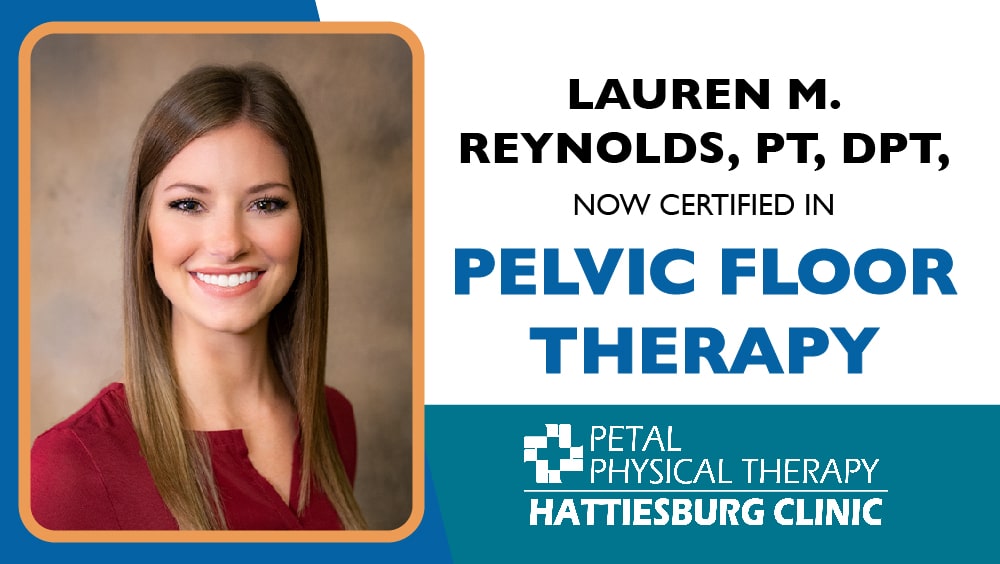Lauren M. Reynolds, PT, DPT, Now Certified in Pelvic Floor Therapy
Lauren M. Reynolds, PT, DPT, with Hattiesburg Clinic Petal Physical Therapy recently obtained certification in a specialized branch of physical therapy known as pelvic floor therapy.
Pelvic floor therapy, also known as pelvic floor rehabilitation or pelvic floor physical therapy, is a specialized form of therapy that focuses on the muscles, ligaments and tissues of the pelvic floor. The pelvic floor refers to a group of muscles that support the pelvic organs, including the bladder, uterus (in women) and rectum.
Pelvic floor therapy can be used to treat:
- Hip, lower back and sacroiliac (SI) joint pain – The pelvic floor muscles are interconnected with the muscles and structures of the hips, lower back and SI joint. Dysfunction in the pelvic floor can contribute to or exacerbate pain in these areas.
- Groin, lower abdomen, rib, pubic or tailbone pain – These areas are closely interconnected with the pelvic floor muscles and dysfunction in the pelvic floor can contribute to or worsen pain in these regions.
- General pelvic pain – Pelvic floor therapy is often utilized in the treatment of pelvic pain conditions such as pelvic floor muscle spasm, chronic vulvar pain, chronic bladder pain and tailbone pain.
- Constipation – The pelvic floor muscles play a crucial role in bowel function and dysfunction in these muscles can contribute to difficulties with bowel movements and chronic constipation.
- Pelvic organ prolapse – Pelvic organ prolapse occurs when one or more of the pelvic organs, such as the bladder, uterus, or rectum, descend or bulge into the vaginal area due to weakened or stretched pelvic floor muscles and connective tissues.
- Frequent urination and overactive bladder – Pelvic floor therapy can help by targeting the muscles of the pelvic floor to improve their coordination, strength and relaxation.
- Stress/urge/mixed urinary incontinence – Pelvic floor therapy can address multiple aspects of urinary incontinence by strengthening the pelvic floor muscles and improving bladder control.
- Bowel incontinence – Pelvic floor therapy for bowel incontinence includes exercises and techniques designed to strengthen and retrain the muscles that play a vital role in bowel control.
- Prenatal back/hip pain and mobility – Pelvic floor therapy focuses on strengthening and stabilizing the muscles of the pelvic floor, which can help support the lower back and hips.
- Labor prep – Pelvic floor therapy can be helpful as expecting mothers prepare for labor and delivery by focusing on muscle awareness and relaxation, strengthening pelvic floor muscles, perineal massage, breath control and relaxation techniques and improving posture and body mechanics.
- Postpartum pain and dysfunction – Postpartum women often experience pelvic floor dysfunction due to the stresses of pregnancy and childbirth.
- Diastasis recti – This condition, characterized by the separation of the abdominal muscles, can be treated with pelvic floor therapy by strengthening the core muscles, including the abdominal muscles, along with the pelvic floor muscles.
- Perineal or c-section scar mobility and sensitivity – Pelvic floor therapy can reduce pain and improve strength, flexibility and coordination of the pelvic floor muscles by focusing on scar tissue mobilization, desensitization, muscle re-education and pain management techniques.
Through a specialized certification program, Reynolds becomes the only physical therapist within the clinic to hold qualifications that allow her to evaluate and treat conditions such as those listed above. Evaluations can include:
- External and internal pelvic exam; strength testing of the pelvic floor
- Internal and external myofascial and soft tissue treatments for pelvic and abdominal muscles
- Patient-related education and behavioral instructions for urogenital dysfunction
- Evaluation and manual treatment for abdominal wall dysfunction including diastasis recti
- Surface electromyography (sEMG) biofeedback
- Implementing trauma-informed care
With a whole-body approach to care, Reynolds provides patients a customized treatment plan geared towards improving quality of life, decreasing pain and improving function. Working in collaboration with a physician, each plan typically includes at least one session per week for eight to 12 weeks.
Congratulations to Ms. Reynolds for completing this specialized training and attaining certification in pelvic floor therapy. We are pleased to have her working with our physicians and providing high-quality care to our patients.
For more information, or to schedule an appointment for pelvic floor therapy, please call Hattiesburg Clinic Petal Physical Therapy at (601) 583-9464.

